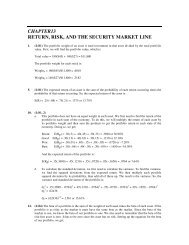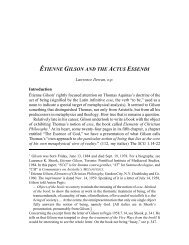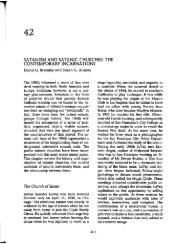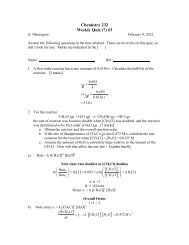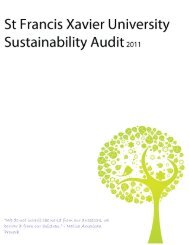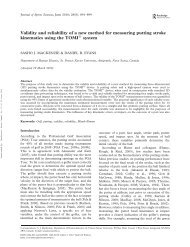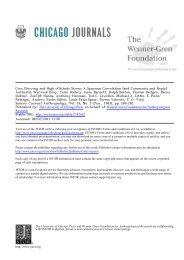- Page 1 and 2: 461 GOTTHOLD EPHRAIM LESSING 1729 -
- Page 3 and 4: GOTTHOLD EPHRAIM LESSING / 463 Laoc
- Page 5 and 6: Laocoön / 465 A third, who examine
- Page 7 and 8: Laocoön / 467 * * * The law of the
- Page 9 and 10: Laocoön / 469 go. Thus, if Laocoö
- Page 11 and 12: Laocoön / 471 are so brief in desc
- Page 13 and 14: Laocoön / 473 posed to be? If her
- Page 15 and 16: Laocoön / 475 analysis we learn li
- Page 17 and 18: Laocoön / 477 I shall reply to thi
- Page 19 and 20: Laocoön / 479 eration must be thei
- Page 21 and 22: 481 FRIEDRICH VON SCHILLER 1759 -18
- Page 23 and 24: On the Aesthetic Education of Man /
- Page 25 and 26: On the Aesthetic Education of Man /
- Page 27: On the Aesthetic Education of Man /
- Page 31 and 32: On the Aesthetic Education of Man /
- Page 33 and 34: 493 MARY WOLLSTONECRAFT 1759 -1797
- Page 35 and 36: MARY WOLLSTONECRAFT / 495 Unlike ot
- Page 37 and 38: A Vindication of the Rights of Woma
- Page 39 and 40: A Vindication of the Rights of Woma
- Page 41 and 42: A Vindication of the Rights of Woma
- Page 43 and 44: A Vindication of the Rights of Woma
- Page 45 and 46: GERMAINE NECKER DE STAËL / 505 Eri
- Page 47 and 48: Essay on Fictions / 507 bibliograph
- Page 49 and 50: Essay on Fictions / 509 deprive us
- Page 51 and 52: Essay on Fictions / 511 the recurre
- Page 53 and 54: Essay on Fictions / 513 development
- Page 55 and 56: Literature’s Relationship To Soci
- Page 57 and 58: Literature’s Relationship To Soci
- Page 59 and 60: Literature’s Relationship To Soci
- Page 61 and 62: FRIEDRICH SCHLEIERMACHER / 521 argu
- Page 63 and 64: FRIEDRICH SCHLEIERMACHER / 523 as t
- Page 65 and 66: Hermeneutics / 525 ing about the ex
- Page 67 and 68: Hermeneutics / 527 2. Should the gr
- Page 69 and 70: Hermeneutics / 529 the main line of
- Page 71 and 72: Hermeneutics / 531 1. This results
- Page 73 and 74: Hermeneutics / 533 explanatory note
- Page 75 and 76: Hermeneutics / 535 3. The goal of g
- Page 77 and 78: GEORG WILHELM FRIEDRICH HEGEL / 537
- Page 79 and 80:
GEORG WILHELM FRIEDRICH HEGEL / 539
- Page 81 and 82:
Phenomenology of Spirit / 541 Hegel
- Page 83 and 84:
Phenomenology of Spirit / 543 ment
- Page 85 and 86:
Phenomenology of Spirit / 545 becau
- Page 87 and 88:
Lectures on Fine Art / 547 the form
- Page 89 and 90:
Lectures on Fine Art / 549 by refle
- Page 91 and 92:
3. That is, the different historica
- Page 93 and 94:
Lectures on Fine Art / 553 minate o
- Page 95 and 96:
Lectures on Fine Art / 555 medium a
- Page 97 and 98:
WILLIAM WORDSWORTH / 557 as a natio
- Page 99 and 100:
Preface to Lyrical Ballads / 559 si
- Page 101 and 102:
Preface to Lyrical Ballads / 561 mo
- Page 103 and 104:
Preface to Lyrical Ballads / 563 no
- Page 105 and 106:
Preface to Lyrical Ballads / 565 th
- Page 107 and 108:
Preface to Lyrical Ballads / 567 ar
- Page 109 and 110:
Preface to Lyrical Ballads / 569 co
- Page 111 and 112:
Preface to Lyrical Ballads / 571 re
- Page 113 and 114:
Preface to Lyrical Ballads / 573 mu
- Page 115 and 116:
Preface to Lyrical Ballads / 575 fo
- Page 117 and 118:
Preface to Lyrical Ballads / 577 pe
- Page 119 and 120:
SAMUEL TAYLOR COLERIDGE / 579 More
- Page 121 and 122:
SAMUEL TAYLOR COLERIDGE / 581 thold
- Page 123 and 124:
SAMUEL TAYLOR COLERIDGE / 583 cism
- Page 125 and 126:
Biographia Literaria / 585 (and a m
- Page 127 and 128:
Biographia Literaria / 587 by awake
- Page 129 and 130:
Biographia Literaria / 589 works th
- Page 131 and 132:
PERCY BYSSHE SHELLEY / 591 and our
- Page 133 and 134:
PERCY BYSSHE SHELLEY / 593 of his a
- Page 135 and 136:
A Defence of Poetry / 595 and the R
- Page 137 and 138:
A Defence of Poetry / 597 are usual
- Page 139 and 140:
A Defence of Poetry / 599 The trage
- Page 141 and 142:
A Defence of Poetry / 601 For the e
- Page 143 and 144:
A Defence of Poetry / 603 The crow
- Page 145 and 146:
A Defence of Poetry / 605 The poetr
- Page 147 and 148:
A Defence of Poetry / 607 But poets
- Page 149 and 150:
A Defence of Poetry / 609 the poetr
- Page 151 and 152:
A Defence of Poetry / 611 exultatio
- Page 153 and 154:
RALPH WALDO EMERSON / 613 The secon
- Page 155 and 156:
RALPH WALDO EMERSON / 615 (1860), b
- Page 157 and 158:
The American Scholar / 617 Ralph L.
- Page 159 and 160:
The American Scholar / 619 and utte
- Page 161 and 162:
The Poet / 621 torical evidence; an
- Page 163 and 164:
The Poet / 623 line, 1 running up f
- Page 165 and 166:
The Poet / 625 sensually treat, as
- Page 167 and 168:
The Poet / 627 which can dwarf any
- Page 169 and 170:
The Poet / 629 the thing is reflect
- Page 171 and 172:
The Poet / 631 contained; 6 — or
- Page 173 and 174:
The Poet / 633 Swedenborg, of all m
- Page 175 and 176:
The Poet / 635 world. This is like
- Page 177 and 178:
EDGAR ALLAN POE / 637 In 1838, stil
- Page 179 and 180:
639 The Philosophy of Composition C
- Page 181 and 182:
The Philosophy of Composition / 641
- Page 183 and 184:
The Philosophy of Composition / 643
- Page 185 and 186:
The Philosophy of Composition / 645
- Page 187 and 188:
KARL MARX and FRIEDRICH ENGELS / 64
- Page 189 and 190:
KARL MARX and FRIEDRICH ENGELS / 64
- Page 191 and 192:
Economic and Philosophic Manuscript
- Page 193 and 194:
Economic and Philosophic Manuscript
- Page 195 and 196:
The German Ideology / 655 but denie
- Page 197 and 198:
657 From The Communist Manifesto 1
- Page 199 and 200:
The Communist Manifesto / 659 The b
- Page 201 and 202:
661 From Grundrisse 1 * * * In the
- Page 203 and 204:
Capital, Volume 1 / 663 on the cont
- Page 205 and 206:
Capital, Volume 1 / 665 their eyes,
- Page 207 and 208:
Capital, Volume 1 / 667 socially ne
- Page 209 and 210:
Capital, Volume 1 / 669 operates in
- Page 211 and 212:
Capital, Volume 1 / 671 omy discard
- Page 213 and 214:
Capital, Volume 1 / 673 once be sup
- Page 215 and 216:
Letter from Friedrich Engels to Jos
- Page 217 and 218:
CHARLES BAUDELAIRE / 677 predicted,
- Page 219 and 220:
CHARLES BAUDELAIRE / 679 idler on t
- Page 221 and 222:
The Paint er of Modern Life / 681 m
- Page 223 and 224:
The Paint er of Modern Life / 683 t
- Page 225 and 226:
The Paint er of Modern Life / 685 g
- Page 227 and 228:
The Paint er of Modern Life / 687 a
- Page 229 and 230:
The Paint er of Modern Life / 689 p
- Page 231 and 232:
691 MATTHEW ARNOLD 1822-1888 In an
- Page 233 and 234:
MATTHEW ARNOLD / 693 sir philip sid
- Page 235 and 236:
695 The Function of Criticism at th
- Page 237 and 238:
The Function of Criticism at the Pr
- Page 239 and 240:
The Function of Criticism at the Pr
- Page 241 and 242:
The Function of Criticism at the Pr
- Page 243 and 244:
The Function of Criticism at the Pr
- Page 245 and 246:
The Function of Criticism at the Pr
- Page 247 and 248:
The Function of Criticism at the Pr
- Page 249 and 250:
The Function of Criticism at the Pr
- Page 251 and 252:
The Function of Criticism at the Pr
- Page 253 and 254:
The Function of Criticism at the Pr
- Page 255 and 256:
Culture and Anarchy / 715 see thing
- Page 257 and 258:
Culture and Anarchy / 717 a former
- Page 259 and 260:
Culture and Anarchy / 719 splendid
- Page 261 and 262:
WALTER PATER / 721 dominant idea of
- Page 263 and 264:
WALTER PATER / 723 of projecting ni
- Page 265 and 266:
Studies in the History of the Re na
- Page 267 and 268:
Studies in the History of the Re na
- Page 269 and 270:
Studies in the History of the Re na
- Page 271 and 272:
STÉPHANE MALLARMÉ / 731 Writing w
- Page 273 and 274:
STÉPHANE MALLARMÉ / 733 Indeed, F
- Page 275 and 276:
Crisis in Poetry / 735 A witness to
- Page 277 and 278:
Crisis in Poetry / 737 would be at
- Page 279 and 280:
Crisis in Poetry / 739 An order of
- Page 281 and 282:
HENRY JAMES / 741 sites for learnin
- Page 283 and 284:
HENRY JAMES / 743 claims. In perhap
- Page 285 and 286:
The Art of Fiction / 745 incomplete
- Page 287 and 288:
The Art of Fiction / 747 note, for
- Page 289 and 290:
The Art of Fiction / 749 lection of
- Page 291 and 292:
The Art of Fiction / 751 me to be t
- Page 293 and 294:
The Art of Fiction / 753 his idea,
- Page 295 and 296:
The Art of Fiction / 755 to him; bu
- Page 297 and 298:
The Art of Fiction / 757 Besant’s
- Page 299 and 300:
FRIEDRICH NIETZ SCHE / 759 itself.
- Page 301 and 302:
FRIEDRICH NIETZ SCHE / 761 inhabit
- Page 303 and 304:
FRIEDRICH NIETZ SCHE / 763 apart fr
- Page 305 and 306:
On Truth and Lying in a Non- Moral
- Page 307 and 308:
On Truth and Lying in a Non- Moral
- Page 309 and 310:
On Truth and Lying in a Non- Moral
- Page 311 and 312:
On Truth and Lying in a Non- Moral
- Page 313 and 314:
On Truth and Lying in a Non- Moral
- Page 315 and 316:
The Birth of Tragedy / 775 ation, w
- Page 317 and 318:
The Birth of Tragedy / 777 regardin
- Page 319 and 320:
The Birth of Tragedy / 779 plain th
- Page 321 and 322:
The Birth of Tragedy / 781 predomin
- Page 323 and 324:
The Birth of Tragedy / 783 Only in
- Page 325 and 326:
OSCAR WILDE / 785 At the same time,
- Page 327 and 328:
OSCAR WILDE / 787 martyred by arrow
- Page 329 and 330:
OSCAR WILDE / 789 bibliography Wild
- Page 331 and 332:
The Decay of Lying / 791 age, the s
- Page 333 and 334:
The Decay of Lying / 793 judge from
- Page 335 and 336:
The Critic as Artist / 795 Arnold
- Page 337 and 338:
The Critic as Artist / 797 critics
- Page 339 and 340:
The Critic as Artist / 799 passion
- Page 341 and 342:
The Critic as Artist / 801 desire
- Page 343 and 344:
The Critic as Artist / 803 tell one
- Page 345 and 346:
The Critic as Artist / 805 just as
- Page 347 and 348:
SIGMUND FREUD / 807 we can look out
- Page 349 and 350:
SIGMUND FREUD / 809 account, was no
- Page 351 and 352:
SIGMUND FREUD / 811 simple “key
- Page 353 and 354:
SIGMUND FREUD / 813 bibliography Th
- Page 355 and 356:
The Interpretation of Dreams / 815
- Page 357 and 358:
The Interpretation of Dreams / 817
- Page 359 and 360:
The Interpretation of Dreams / 819
- Page 361 and 362:
The Interpretation of Dreams / 821
- Page 363 and 364:
The Interpretation of Dreams / 823
- Page 365 and 366:
The “Uncanny” / 825 which, inhi
- Page 367 and 368:
The “Uncanny” / 827 it so comfo
- Page 369 and 370:
The “Uncanny” / 829 he reminds
- Page 371 and 372:
The “Uncanny” / 831 returned. W
- Page 373 and 374:
The “Uncanny” / 833 reached the
- Page 375 and 376:
Sie fühlt dass ich ganz sicher ein
- Page 377 and 378:
The “Uncanny” / 837 animistic s
- Page 379 and 380:
The “Uncanny” / 839 by some imp
- Page 381 and 382:
Fetishism / 841 We have already ask
- Page 383 and 384:
Fetishism / 843 that women have a p
- Page 385 and 386:
FERDINAND DE SAUSSURE / 845 under t
- Page 387 and 388:
FERDINAND DE SAUSSURE / 847 and phr
- Page 389 and 390:
FERDINAND DE SAUSSURE / 849 sible t
- Page 391 and 392:
Course in General Linguistics / 851
- Page 393 and 394:
Course in General Linguistics / 853
- Page 395 and 396:
Course in General Linguistics / 855
- Page 397 and 398:
Course in General Linguistics / 857
- Page 399 and 400:
Course in General Linguistics / 859
- Page 401 and 402:
Course in General Linguistics / 861
- Page 403 and 404:
Course in General Linguistics / 863
- Page 405 and 406:
Course in General Linguistics / 865
- Page 407 and 408:
867 W. E. B. Du BOIS 1868-1963 W. E
- Page 409 and 410:
W. E. B. Du BOIS / 869 who maintain
- Page 411 and 412:
Criteria of Negro Art / 871 In the
- Page 413 and 414:
Criteria of Negro Art / 873 French.
- Page 415 and 416:
Criteria of Negro Art / 875 by the
- Page 417 and 418:
LEON TROTSKY / 877 I had a classmat
- Page 419 and 420:
LEON TROTSKY / 879 and toward the d
- Page 421 and 422:
Literature and Revolution / 881 The
- Page 423 and 424:
Literature and Revolution / 883 (th
- Page 425 and 426:
Literature and Revolution / 885 the
- Page 427 and 428:
Literature and Revolution / 887 It
- Page 429 and 430:
Literature and Revolution / 889 Gre
- Page 431 and 432:
Literature and Revolution / 891 by
- Page 433 and 434:
VIRGINIA WOOLF / 893 across London
- Page 435 and 436:
VIRGINIA WOOLF / 895 Writing with
- Page 437 and 438:
A Room of One’s Own / 897 pages.
- Page 439 and 440:
A Room of One’s Own / 899 privacy
- Page 441 and 442:
A Room of One’s Own / 901 spondin
- Page 443 and 444:
A Room of One’s Own / 903 What, t
- Page 445 and 446:
GYÖRGY LUKÁCS / 905 There must be
- Page 447 and 448:
GYÖRGY LUKÁCS / 907 and the simul
- Page 449 and 450:
The Historical Novel / 909 Arato an
- Page 451 and 452:
The Historical Novel / 911 torical
- Page 453 and 454:
The Historical Novel / 913 polemic
- Page 455 and 456:
The Historical Novel / 915 the Rhin
- Page 457 and 458:
The Historical Novel / 917 Despite
- Page 459 and 460:
The Historical Novel / 919 ishable
- Page 461 and 462:
Boris Eichenbaum / 921 ideology, th
- Page 463 and 464:
Boris Eichenbaum / 923 malists’ a
- Page 465 and 466:
925 From The Theory of the “Forma
- Page 467 and 468:
The Theory of the “Formal Method
- Page 469 and 470:
The Theory of the “Formal Method
- Page 471 and 472:
The Theory of the “Formal Method
- Page 473 and 474:
The Theory of the “Formal Method
- Page 475 and 476:
The Theory of the “Formal Method
- Page 477 and 478:
The Theory of the “Formal Method
- Page 479 and 480:
The Theory of the “Formal Method
- Page 481 and 482:
The Theory of the “Formal Method
- Page 483 and 484:
The Theory of the “Formal Method
- Page 485 and 486:
The Theory of the “Formal Method
- Page 487 and 488:
The Theory of the “Formal Method
- Page 489 and 490:
The Theory of the “Formal Method
- Page 491 and 492:
T. S. ELIOT / 951 ture, from litera
- Page 493 and 494:
T. S. ELIOT / 953 Cathedral (1935),
- Page 495 and 496:
Tradition and the Individual Talent
- Page 497 and 498:
Tradition and the Individual Talent
- Page 499 and 500:
Tradition and the Individual Talent
- Page 501 and 502:
The Metaphysical Poets / 961 lected
- Page 503 and 504:
The Metaphysical Poets / 963 plied
- Page 505 and 506:
prejudicing their case by the adjec
- Page 507 and 508:
After this brief exposition of a th
- Page 509 and 510:
969 JOHN CROWE RANSOM 1888-1974 The
- Page 511 and 512:
Criticism, Inc. / 971 discrete poet
- Page 513 and 514:
Criticism, Inc. / 973 before long,
- Page 515 and 516:
Criticism, Inc. / 975 sort. Debate
- Page 517 and 518:
Criticism, Inc. / 977 and not exter
- Page 519 and 520:
Criticism, Inc. / 979 Aristotle con
- Page 521 and 522:
Criticism, Inc. / 981 understanding
- Page 523 and 524:
Martin Heidegger / 983 In the early
- Page 525 and 526:
Language / 985 and Art Works (1985)
- Page 527 and 528:
Language / 987 speak of an abyss wh
- Page 529 and 530:
Wandering ones, more than a few, Co
- Page 531 and 532:
everything else, also going to deny
- Page 533 and 534:
Language / 993 The third and fourth
- Page 535 and 536:
Language / 995 the gathering middle
- Page 537 and 538:
Language / 997 merely a higher mode
- Page 539 and 540:
Antonio Gramsci / 999 Gramsci was b
- Page 541 and 542:
Antonio Gramsci / 1001 to move away
- Page 543 and 544:
The Formation of the Intellectuals
- Page 545 and 546:
The Formation of the Intellectuals
- Page 547 and 548:
The Formation of the Intellectuals
- Page 549 and 550:
Zora Neale Hurston / 1009 American
- Page 551 and 552:
Characteristics of Negro Expression
- Page 553 and 554:
Characteristics of Negro Expression
- Page 555 and 556:
Characteristics of Negro Expression
- Page 557 and 558:
Characteristics of Negro Expression
- Page 559 and 560:
Characteristics of Negro Expression
- Page 561 and 562:
Characteristics of Negro Expression
- Page 563 and 564:
What White Publishers Won’t Print
- Page 565 and 566:
What White Publishers Won’t Print
- Page 567 and 568:
ERICH AUERBACH / 1027 These are the
- Page 569 and 570:
ERICH AUERBACH / 1029 Auerbach’s
- Page 571 and 572:
Mimesis / 1031 reader about Autolyc
- Page 573 and 574:
Mimesis / 1033 not only of speeches
- Page 575 and 576:
Mimesis / 1035 perceptible except t
- Page 577 and 578:
Mimesis / 1037 It would be difficul
- Page 579 and 580:
Mimesis / 1039 because the moral, r
- Page 581 and 582:
Mimesis / 1041 proper place in the
- Page 583 and 584:
Mimesis / 1043 patterns and themes,
- Page 585 and 586:
Mimesis / 1045 in events not only a
- Page 587 and 588:
WALTER BENJAMIN / 1047 of the most
- Page 589 and 590:
WALTER BENJAMIN / 1049 Marxist late
- Page 591 and 592:
Work of Art . . . Technological Rep
- Page 593 and 594:
Work of Art . . . Technological Rep
- Page 595 and 596:
Work of Art . . . Technological Rep
- Page 597 and 598:
Work of Art . . . Technological Rep
- Page 599 and 600:
Work of Art . . . Technological Rep
- Page 601 and 602:
Work of Art . . . Technological Rep
- Page 603 and 604:
Work of Art . . . Technological Rep
- Page 605 and 606:
Work of Art . . . Technological Rep
- Page 607 and 608:
Work of Art . . . Technological Rep
- Page 609 and 610:
Work of Art . . . Technological Rep
- Page 611 and 612:
Work of Art . . . Technological Rep
- Page 613 and 614:
MIKHAIL M. BAKHTIN / 1073 myelitis,
- Page 615 and 616:
MIKHAIL M. BAKHTIN / 1075 include V
- Page 617 and 618:
Discourse in the Novel / 1077 Towar
- Page 619 and 620:
Discourse in the Novel / 1079 sity
- Page 621 and 622:
Discourse in the Novel / 1081 ratio
- Page 623 and 624:
Discourse in the Novel / 1083 what
- Page 625 and 626:
Discourse in the Novel / 1085 socio
- Page 627 and 628:
Discourse in the Novel / 1087 conte
- Page 629 and 630:
Discourse in the Novel / 1089 an ac
- Page 631 and 632:
Discourse in the Novel / 1091 conce
- Page 633 and 634:
Discourse in the Novel / 1093 socia
- Page 635 and 636:
Discourse in the Novel / 1095 In ge
- Page 637 and 638:
Discourse in the Novel / 1097 creat
- Page 639 and 640:
Discourse in the Novel / 1099 own i
- Page 641 and 642:
Discourse in the Novel / 1101 conse
- Page 643 and 644:
Discourse in the Novel / 1103 from
- Page 645 and 646:
Discourse in the Novel / 1105 The p



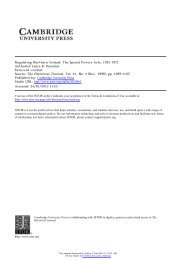
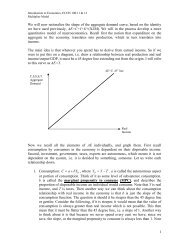
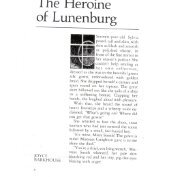
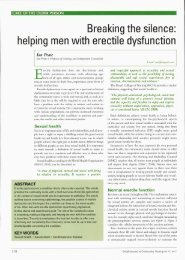
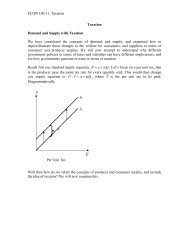
![The Rink - Cyril Dabydeen[1].pdf](https://img.yumpu.com/21946808/1/155x260/the-rink-cyril-dabydeen1pdf.jpg?quality=85)

